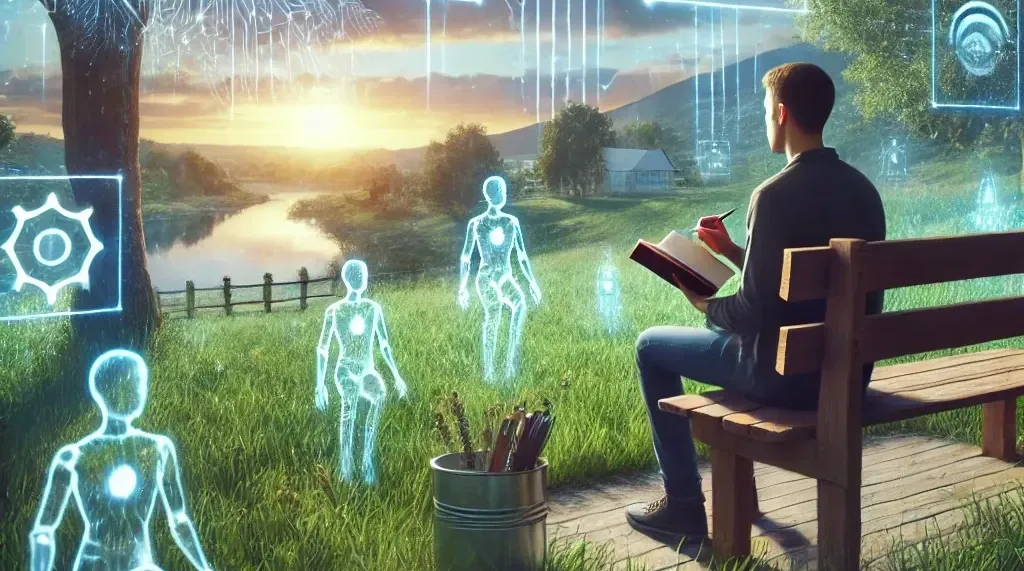Your life plan vs AI

Artificial intelligence (AI) is no longer just a buzzword; for some, it has become seamlessly integrated into their daily lives. From fitness-tracking apps to algorithms that predict our next purchase, AI is transforming industries, automating processes, and influencing decisions that shape the way we live and work. Yet, amid this digital revolution, there remains one thing AI should not take from us: the power to chart our own course and take control of how we plan our lives.
The Unique Power of Human Planning
AI excels in many areas—crunching data, identifying patterns, and even predicting outcomes with incredible accuracy. However, the one thing it cannot replicate is the human experience. Planning your life is not just about creating to-do lists or setting up long-term goals. It’s about the stories you craft, the decisions you make, and the values you hold dear. These personal choices give your life meaning, something AI lacks the capacity to understand or appreciate.
When you sit down to plan your life—whether for the next week or the next decade—you are engaging in a deeply human act of storytelling. You become both the author and the protagonist, shaping your journey based on experiences, hopes, emotions, and relationships. Unlike an AI-driven plan that might optimize for efficiency or output, your life’s narrative is full of nuance, spontaneity, and emotional depth. It’s driven by personal growth, setbacks, aspirations, and how you choose to rise in the face of challenges.
Writing your own story in an AI-Driven world
Planning is much more than setting goals; it’s about creating a blueprint for a meaningful life. In a world where AI increasingly influences decision-making, how you plan your life could become the last stronghold of authentic human creativity and self-determination.
Here’s how planning your life becomes an art form, a process AI can't mimic:
- Emotional Resonance: AI can process and analyze data, but it can’t feel emotions. Your decisions are often influenced by feelings—your passion for a certain project, the joy you get from a hobby, or the way love for your family shapes your priorities. This emotional intelligence is unique to human beings and plays a key role in how we plan for the future. A plan driven by emotion, empathy, and understanding is something AI cannot generate.
- Spontaneity and Flexibility: While AI operates based on patterns and predictive models, life doesn’t always follow those rules. You might have an entire week planned out, but an unexpected opportunity, a chance meeting, or even a spontaneous change in direction can rewrite the narrative. These moments of spontaneity add richness to your life story—something no algorithm can predict.
- Personal Values and Morality: AI is designed to optimize, but it doesn’t have values. When you make decisions, you're not just choosing the most efficient path. You're making decisions based on your beliefs, ethics, and what you stand for. Whether it’s dedicating time to volunteer for a cause close to your heart or prioritizing family over career advancement, your personal values play a key role in shaping your life. And these values aren’t just data points—they’re deeply ingrained principles that define your journey.
- Self-Reflection and Growth: Part of planning your life involves understanding who you are and where you want to go. Self-reflection, learning from past experiences, and evolving as a person are deeply personal experiences. AI can track your productivity, but it can't evaluate your internal growth or the wisdom you gain over time. Your life is not just a series of tasks to complete; it’s a story of personal transformation.
The Battle for Autonomy: Don’t Let AI Dictate Your Life
The rise of AI has led to a surge in productivity tools, apps, and algorithms that claim to help optimize your life. While these can certainly be helpful, there’s a real danger in letting AI and automation take too much control. You run the risk of letting external systems dictate your pace, your direction, and even your values. But when you plan your life consciously and intentionally, you’re taking back control. You’re making sure that the narrative stays in your hands, not an algorithm's.
How to Plan with Purpose in an AI-Influenced World
To safeguard your autonomy and creativity in a world increasingly shaped by AI, it’s important to approach planning in a mindful, purposeful way. Here are some steps to ensure you remain the author of your own life story:
- Reflect on Your Why: Before diving into planning, take a moment to reflect on your purpose. Why are you setting these goals? What deeper values or desires are driving you? AI might suggest the most efficient way to achieve something, but only you can know why it's important to you.
- Embrace Flexibility: Life is unpredictable, and that’s what makes it exciting. While planning gives you direction, make sure to build in space for spontaneity and course correction. Be open to new opportunities and unexpected twists that could enrich your story.
- Listen to Your Intuition: AI can’t tap into intuition, but you can. Sometimes your gut feeling tells you more than data ever could. Trust it when planning, even if the path seems unclear.
- Prioritize Balance: AI tends to optimize for one thing—efficiency, speed, profit. But as a human being, your goals are far more complex. When planning your life, aim for a balance that brings fulfillment across all areas, from career to relationships, health, and personal growth.
- Write Regular Updates to Your Life’s Story: Life planning isn’t a one-time event. Revisit your goals and reflect on how your journey has evolved. This practice ensures that your plans remain aligned with who you are becoming, not just who you were when you set them.
Final Thoughts: Crafting Your Own Future
In a world where AI increasingly influences how we live and work, the act of life planning remains one of the most personal, creative, and human things we can do. By planning your life with purpose, emotion, and intention, you ensure that you remain the protagonist of your own story. You shape your future not as a set of tasks to be optimized, but as a narrative rich with meaning, growth, and connection. While AI may change the landscape of many aspects of life, the way you plan your own journey will always remain uniquely yours.
In the end, you’re not just living life—you’re writing your own story. And that’s something no machine can replicate.





